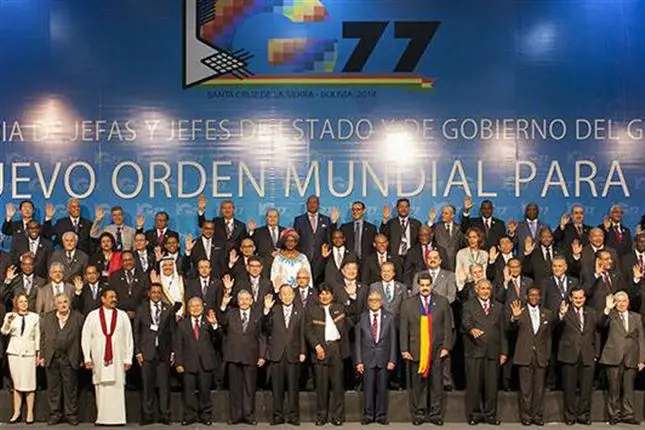G77 is set to hold a high level Third South Summit which will be held at Speke Resort Munyonyo in Kampala, from January 21-23, 2023, under the theme Leaving No One Behind aimed at boosting socio-economic development of member States. During this time, Uganda will be seen assume the chairmanship from 2024 to 2026 and will head the Kampala Declaration for one year, which will be adopted during the summit.
Uganda is to host at a time when the world is undergoing several global challenges including post Covid-19 challenges, Russia-Ukraine war, Homosexuality Vs Anti-Homosexuality Act, climate change, among others.
The summit will be expected to adopt a document known as the Kampala Declaration which gives Uganda as a host, an opportunity to head and organize meetings through the Mission in New York on behalf of other member States to the UN.
The summit will provide 134 member States of G77 with an opportunity to deepen their cooperation in the competitive world in terms of trade, investment, poverty eradication, climate change, peace and security across borderlines, climate change, health resilience in the aftermath of Covid-19, building sustainable development, digital economy, ICT and AI, among others, with the primary goal of maintaining the independence and sovereignty of all developing States.
The Declaration once adopted will summarize the position of the Group on key issues of current international affairs, which will be expected in a declaration of G77 and China since the Group’s main activity is to negotiate as the largest bloc of countries in multilateral and North-South settings in the UN.
The Declaration will see Uganda have permanent staff at the Secretariat to ensure coordination with the G77 Secretariat by providing information and timely response to the Mission of G77 member States in New York in relation to the preparation of Third South Summit.
The summit together with the Declaration will offer and open an equal opportunity for Uganda to showcase her tourist attractions to the rest of the world since there will be delegates from different countries visit Uganda from time to time.
The Declaration will break new ground with a lengthy section on development in the national context, in which the political leaders will be able to improve the performance of their governments in economic and social affairs at the national level.
Uganda is therefore, expected to tackle the issue of unemployment which is affecting most of the African countries, since the Declaration will incorporate economic issues such as economic growth, industrialization, infrastructure, and agriculture, with social and environmental dimensions. For instance, Uganda is currently constructing an oil pipeline. This is one of the developing factors that will see other member States support in buying oil but also, it will give them an opportunity to buy it at a low cost compared to what they are currently purchasing. It will also offer employment opportunities, notwithstanding the fact that, the project will in return generate funds inform of revenue which will help in improving social services.
Respect for the environment has not been left aside as Uganda will deal with climate change since the country is now advocating for afforestation as opposed to deforestation through the implementation of the presidential directive on charcoal ban, wetland protection. This idea can be shared with member States to ensure that the environment is preserved.
Uganda as a chair will have to address the issue of unity and peace building since there are missions Uganda is involved in like negotiations in the Russia-Ukraine war, Sudan, DRC, Somalia under ATMIS, among others with an aim of ending war or ensuring conflict resolution.
Uganda will help other member States in ensuring poverty eradication through advocating for initiatives like the Parish Development Model-PDM, which is aimed at poverty eradication, enhancing trading and widening regional and international/global market of African products. For instance, the Coffee Summit that was recently hosted in Kampala with an aim of ensuring value addition to African coffee, thus boosting productivity and job creation.
In terms of social adherence and cultural building, Uganda passed the Anti-Homosexuality Act 2023 in May this year, which was assented to by President Museveni. This gives Uganda an opportune moment and solid ground to explain to the rest of African countries about homosexuality issues and the importance of maintaining the African culture.
The Declaration will work towards bridging the gaps in many developing countries in meeting the needs of employment, food, water, health care, education, housing, physical infrastructure and energy of their people, as well as the looming environmental crisis, including the negative impacts of climate change in developing countries.
According to some scholars, despite five decades of achievements, there are still serious shortfalls in fulfilling the Group’s objectives, in which developing countries are currently faced with the ongoing and emerging challenges, including the slowdown of the global economy and its effects on them, lack of adequate systemic action and accountability to address the causes and effects of the global financial and economic crises, thus creating the risk of continuing with the pattern of crisis cycles.
Nevertheless, leaders still believe that the main strength of the Group of 77 has been and will be its unity and solidarity, its vision of fair, just and equitable multilateral relations, the commitment of its member States to the well-being and prosperity of the people of the South as well as their commitment to mutually beneficial cooperation.
The G77 is a Group that was started by 77 countries with Uganda being among, aiming at addressing key issues affecting developing countries on the globe. Currently, much as Group 77 comprises of 134 member States, it still maintains it original name (G77) and represents the interests of all the 134 developing countries in the United Nations (UN).















